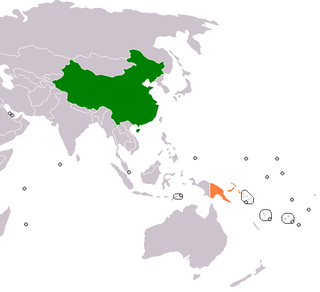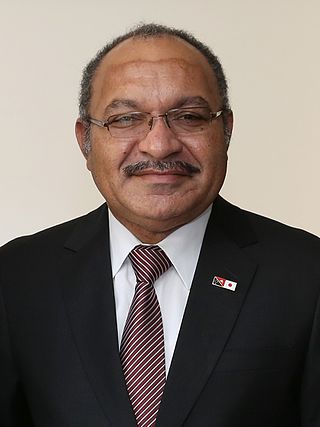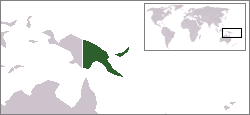
Papua New Guinea, officially the Independent State of Papua New Guinea, is a country in Oceania that comprises the eastern half of the island of New Guinea and its offshore islands in Melanesia. Its capital, located along its southeastern coast, is Port Moresby. The country is the world's third largest island country, with an area of 462,840 km2 (178,700 sq mi).

The economy of Papua New Guinea (PNG) is largely underdeveloped with the vast majority of the population living below the poverty line. However, according to the Asian Development Bank its GDP is expected to grow 3.4% in 2022 and 4.6% in 2023. It is dominated by the agricultural, forestry, and fishing sector and the minerals and energy extraction sector. The agricultural, forestry, and fishing sector accounts for most of the labour force of PNG while the minerals and energy extraction sector, including gold, copper, oil and natural gas is responsible for most of the export earnings.

Australian Aid is the brand name used to identify projects in developing countries supported by the Australian Government. As of 2014 the Department of Foreign Affairs and Trade (DFAT) has been responsible for Australia's official development assistance to developing countries.
With 1.28 percent of the adult population estimated by UNAIDS to be HIV-positive in 2006, Papua New Guinea has one of the most serious HIV/AIDS epidemics in the Asia-Pacific subregion. Although this new prevalence rate is significantly lower than the 2005 UNAIDS estimate of 1.8 percent, it is considered to reflect improvements in surveillance rather than a shrinking epidemic. Papua New Guinea accounts for 70 percent of the subregion's HIV cases and is the fourth country after Thailand, Cambodia, and Burma to be classified as having a generalized HIV epidemic.

The Royal Papua New Guinea Constabulary (RPNGC) is a national police force with jurisdiction throughout all of Papua New Guinea.

The Independent State of Papua New Guinea and China (PRC) established official diplomatic relations in 1976, soon after Papua New Guinea became independent. The two countries currently maintain diplomatic, economic and, to a lesser degree, military relations. Relations are cordial; China is a significant provider of both investments and development aid to Papua New Guinea.
Sir Salamo Injia is a retired Judge and former Chief Justice of Papua New Guinea. Injia was knighted in 2006 and appointed Chief Justice of the Supreme Court of Papua New Guinea in 2008, succeeding Mari Kapi. In 2018, Sir Gibbs Salika replaced him as the Chief Justice of Papua New Guinea. In August 2019, Injia was appointed chair of a commission of inquiry into a controversial state loan of US$1,200,000,000 from the Swiss bank UBS used by the PNG government to buy a stake in the resource company Oil Search.

Deforestation in Papua New Guinea has been extensive and in recent decades from 2001 to 2020, Papua New Guinea lost 1.57Mha of tree cover, equivalent to a 3.7% decrease in tree cover since 2000, and 1.15Gt of CO₂e emissions.

Peter Charles Paire O'Neill is a Papua New Guinean politician who served as the seventh Prime Minister of Papua New Guinea from 2011 to 2019. He has been a Member of Parliament for Ialibu-Pangia since 2002. He is a former cabinet minister and the former leader of the People's National Congress between 2006 and 2022. He resigned his position as prime minister to avoid a vote of no confidence and he was succeeded by James Marape. O'Neill won re-election to the National Parliament of Papua New Guinea in 2022 in the first round with a large majority, which is unusual in the country.
The Papua New Guinea Forest Authority (PNGFA) was established in 1993 under the Forestry Act, 1991. It replaced the former Department of Forest and unified all the Provincial Forest Divisions and the Forest Industries Council. This restructuring was the result of the 1989 Barnett Commission of Inquiry into forestry in Papua New Guinea.

Corruption is rife in Papua New Guinea (PNG). According to The Economist, "PNG's governments are notorious for corruption, and ever run the risk of turning the state into a fully-fledged kleptocracy".
Investigation Task Force Sweep was established in Papua New Guinea (PNG) on 12 August 2011, following a resolution by the National Executive Council (NEC). The initiative was spearheaded by Prime Minister Peter O'Neill as part of his well-publicised anti-corruption drive.

Life expectancy in Papua New Guinea (PNG) at birth was 64 years for men in 2016 and 68 for women.

The Development Policy Centre (Devpol) is an aid and development policy think tank based at the Crawford School of Public Policy in the College of Asia and the Pacific at the Australian National University. Devpol undertakes independent research and promotes practical initiatives to improve the effectiveness of Australian aid, to support the development of Papua New Guinea and the Pacific Islands region, and to contribute to better global development policy.
The Papua New Guinea Greens Party or PNG Greens are a minor political party in Papua New Guinea. Founded in 2001, the party took part in the 2002, 2007, 2012 and 2017 general elections, without winning a seat. They are a member of the Global Greens and of the Asia Pacific Greens Federation.
The Papua New Guinea Constitutional Democratic Party (PNGCDP) is a former political party in Papua New Guinea.

Bryan Jared Kramer was a Papua New Guinea politician and Member of the 10th and 11th Parliament of Papua New Guinea. Formerly a member of the Pangu Party, he founded the Allegiance Party, of which he was the sole MP, in 2018. He ran nine candidates in the 2022 National Elections, including one in each of Madang's seven electorates. Kramer was returned with a sizeable majority, but was unsuccessful in securing the election of another Party member. He was suspended from office on 30 September 2022 pending the outcomes of a leadership tribunal. On Tuesday 28 February 2023 the three-man bench unanimously found Kramer guilty of seven counts against him. A three-man bench recommended dismissal for two counts of "scandalising the judiciary" and fines totalling K10,000 (USD3,000) for five counts related to use of district funds. Kramer was dismissed from office by the Governor General on 24 May 2023. He will not be able to re-contest an election for three years, allowing him to compete in the 2027 election. A by-election for Madang Open will be held in 2023.

The Commander of the Papua New Guinea Defence Force is the highest-ranking military officer of in the Papua New Guinea Defence Force, who is responsible for maintaining the operational command of the military. The current commander is Brigadier general Gilbert Toropo.

Papua New Guinea (PNG) is officially known as the Independent State of Papua New Guinea after gaining absolute independence from Australia on September 16, 1975. PNG is the largest country in the South Pacific region and comprises the eastern side of New Guinea including its islands. Crime in Papua New Guinea, both violent and non-violent have contributed to the developing country's crime rate being one of the highest in the world.

Sir Anthony Siaguru was a Papua New Guinean civil servant, lawyer, international diplomat, politician, sportsman and anti-corruption campaigner.












